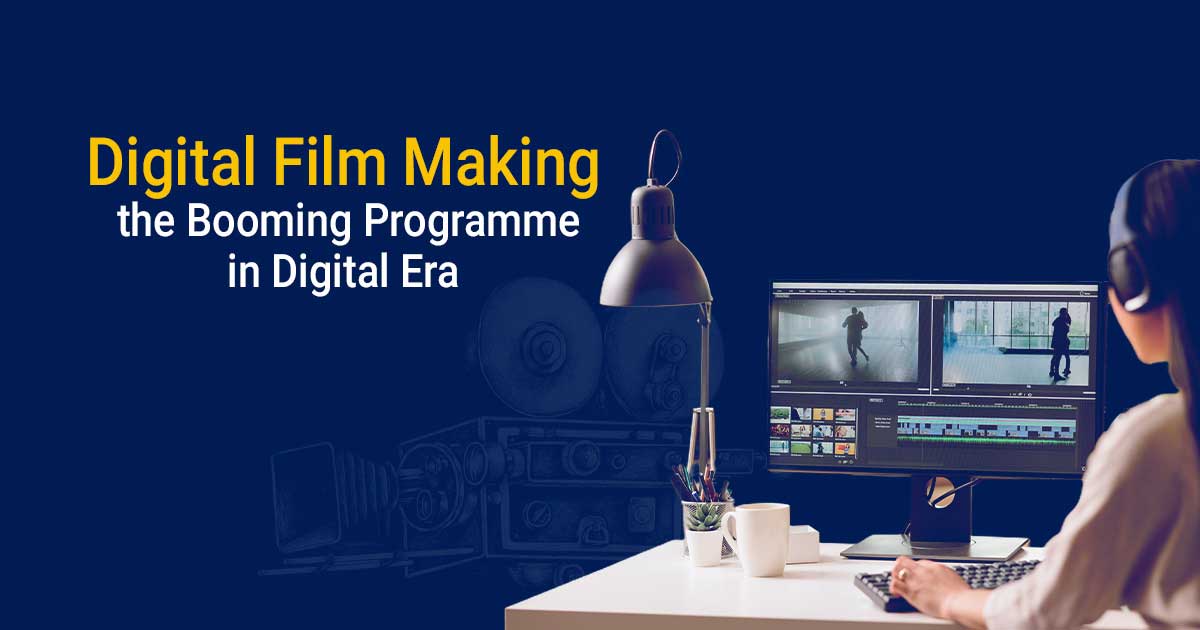Blog Detail


Digital Film Making - the booming programme in digital era
06-02-2023

Anywhere we look around, the miracles of technology surround us. From healthcare, e-commerce, education, industries, and media to even retail, technology has transformed our lives in every way imaginable.
It has brought a paradigm shift in the film industry. From shooting to post-production, editing to distribution and marketing, technology gives a much-needed edge to the film industry.
To anyone wondering how technology can be incorporated into filmmaking, digital filmmaking is the answer to your question. It is the technique of photographing motion pictures as digital images. While film cinematography uses film stock to seize light, digital cinematography uses a digital sensor within a camera that captures light. These images are then stored on tape or digital files.
Digital filmmaking encompasses a series of processes and techniques used in modern films that help filmmakers blend art and digital media creatively. These flexible digital cameras and editing software have improved the scope of cinematographers' and editors' jobs and made it easier. It also allows filmmakers to produce quality films economically.
This major technological breakthrough in the filmmaking industry is good news for aspiring filmmaking students. The advanced technologies ensure engaging and high-definition visuals, improved sound effects, easier editing tools, and better digital film distribution, thereby providing an impressive movie experience to the viewers.
Digital filmmaking is an exciting industry, rendering opportunities for anyone interested in creating content, such as movies, short films, advertisements, documentaries, and other audio and video content.
Being a great digital filmmaker requires a combination of technical, artistic, and scholarly perspectives and can be a great career choice for those seeking a degree in a growing field.
By acquiring an undergraduate degree from one of the CIIMS Group of Institutions, you'll be ready for a range of filmmaking opportunities that come your way. Read on to get a brief overview of the advantages of taking up a digital filmmaking degree at CIIMS Group of Institutions, located in Jayanagar, Bangalore.
Simplified editing
Like digital recording equipment, editing equipment is super affordable and easy to ace. Post-production efforts are thus less cumbersome in the digital world. If someone with no training in digital film editing can do a reasonable job on their Mac, imagine what someone with digital filmmaking career training could do.
Caters to a wide audience
From the viewer's perspective, the takeover by digital filmmaking is visible from all aspects. Cinema lovers can avail the joys of 3D spectacles, VR headgear, IMAX, 7D, and many more. People can also enjoy watching movies in the comfort of their homes on OTT platforms such as Netflix, Disney Hotstar, Amazon Prime, YouTube, and others. Therefore, the movie-making business is now multifaceted. The intervention of technology has not only simplified it but has multiplied the scope of filmmaking, film watching, and other revenue-generating activities.
Today, you no longer need a big marketing budget to reach a wide audience. The digitally formatted films aren't bound to traditional distribution methods. Good content and presentation are all you need. Releasing digital films on OTT platforms can give you massive success and open doors for your filming career.
Digital projection is cost-effective
If we compare the cost of traditional and digital filmmaking, the latter is cheaper and saves a lot of time. Moreover, a digital print is devoid of the risks such as breakdown or physical scratches. It also allows the theatres to show alternate programs, such as live theatre and opera.
Better presentation
Previously, preserving conventional films was tedious and expensive and came with several logistical challenges. However, the advent of digital movies has mitigated all such concerns significantly/ evidently/ substantially. Now, we need a few gigabytes of storage space instead of large physical storage areas of the film. The digital copies of movies can be stored on servers at a fractional cost of storing the physical films.
To conclude, stories can be created effectively with a sound combination of video equipment and computer programs and software. One must be efficient in using lighting techniques in shooting sequences and be well-versed with the technical skills to edit and render videos until post-production.
Producers or directors look out for candidates who possess good management and technical knowledge skills to deliver the best results through great storytelling. Therefore, a well-designed digital filmmaking course can prove useful as it empowers the students with the skills and knowledge to create high-quality stories at par with industry standards.